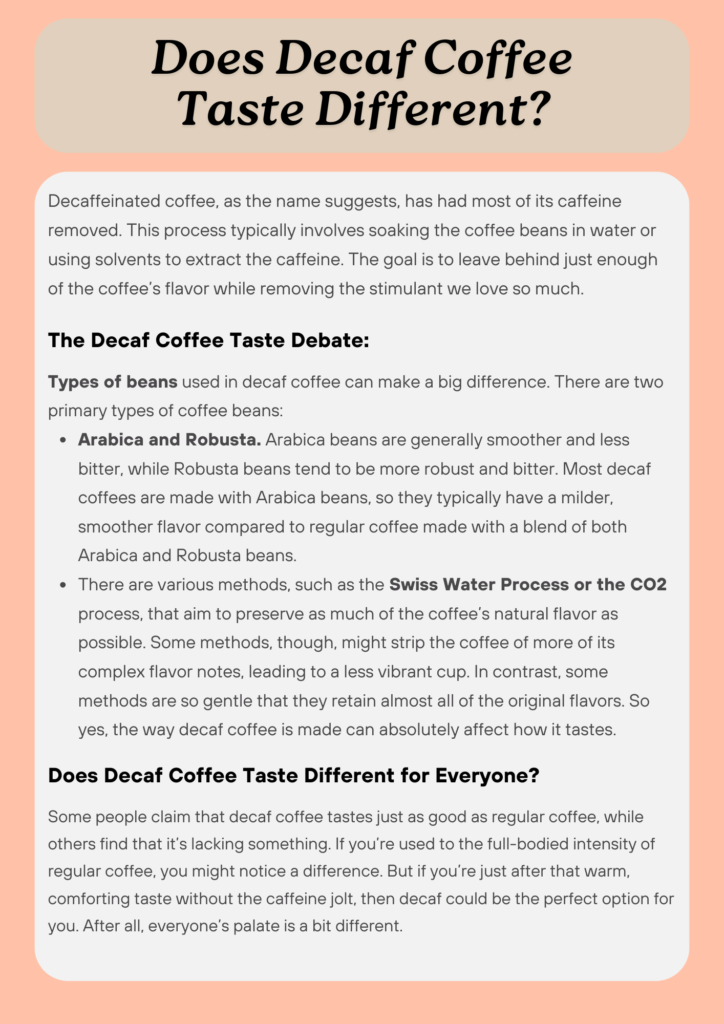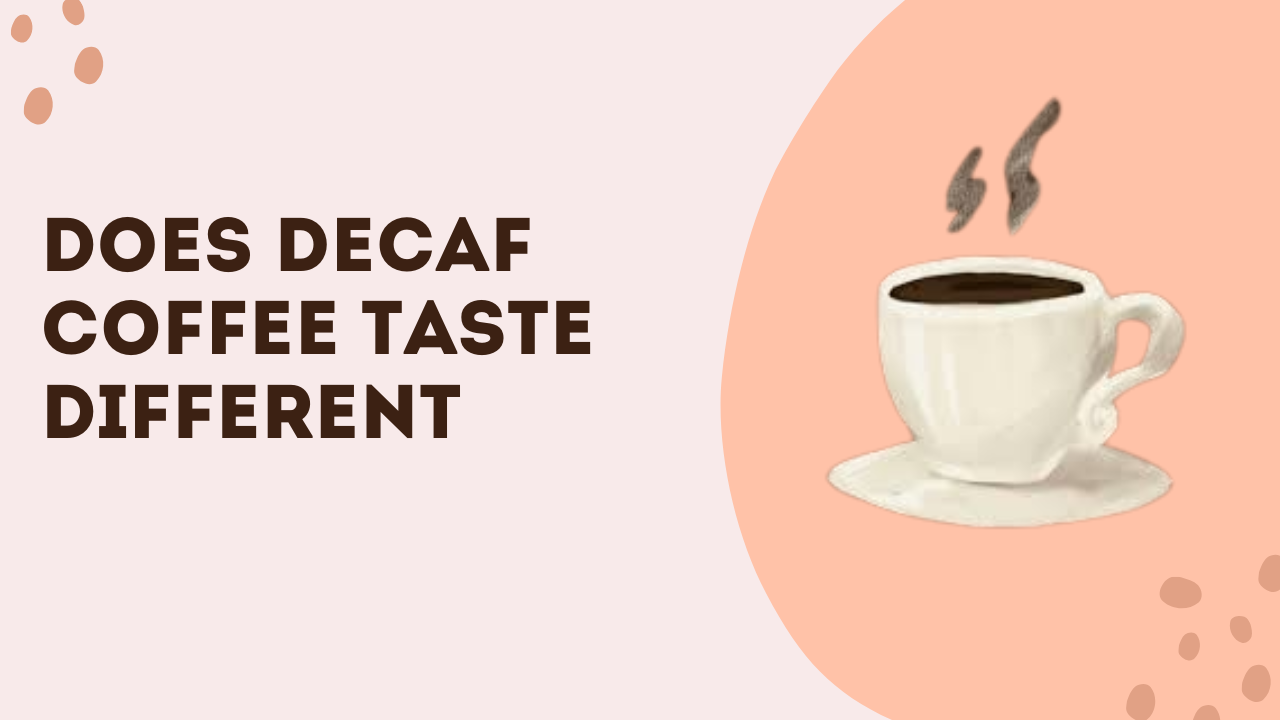Ah, coffee. That magical brew that kick-starts your day, brings comfort in the afternoon, and serves as the perfect companion for conversations, reading, or even just scrolling through your phone. But wait—decaf coffee? It’s a bit of a conundrum, isn’t it? I mean, if you’re taking out the caffeine, does it really still taste like the coffee we know and love?
You’ve probably asked yourself, “Does decaf coffee taste different?” or perhaps someone’s offered you a cup, and you’ve hesitated, wondering whether it will be just as good as your usual caffeinated cup. So, in this article, we’re going to dive into the world of decaf coffee, exploring its taste, the science behind it, and answering that age-old question: does decaf coffee taste different? Let’s talk about it!
Table of Contents
The Basics of Decaf Coffee Taste
First things first, let’s get some context on what decaf coffee actually is. Decaffeinated coffee, as the name suggests, has had most of its caffeine removed. This process typically involves soaking the coffee beans in water or using solvents to extract the caffeine. The goal is to leave behind just enough of the coffee’s flavor while removing the stimulant we love so much. Sounds easy, right? Well, not so fast! The real question remains: does decaf coffee taste different from regular coffee? To answer that, we need to look at a few things.
The Caffeine Factor: Is It All About the Buzz?
Okay, so let’s address the elephant in the room. The main reason we drink coffee in the first place is for that energy boost from caffeine. But when caffeine’s removed, does that change the overall flavor? Well, in some ways, yes. Caffeine is a bitter compound, and when it’s taken out, it can leave behind a less bitter, smoother flavor profile. This might sound great if you’re not into that sharp, slightly bitter taste of regular coffee. But here’s the thing—decaf coffee doesn’t necessarily lose all bitterness. It just might have a different balance of flavors.
Some people might actually prefer the taste of decaf coffee because it can come across as a little smoother and mellower, lacking the bite of regular coffee. But for others, the absence of caffeine can also mean a slightly flatter or less dynamic cup. It’s almost like the difference between drinking a cup of coffee and enjoying a lighter, less intense tea. You get the warmth and comfort, but the punchy jolt of caffeine is missing.
Decaf Coffee Brewing Methods: Does It Matter?
You’ve probably noticed that there are all kinds of brewing methods for coffee—drip, pour-over, French press, and even cold brew. The method you use can actually impact how decaf coffee tastes. That’s because each brewing technique extracts different compounds from the coffee grounds. Some methods might highlight the smoothness of decaf coffee, while others could bring out its inherent flavor profile more strongly.
For instance, a French press will typically yield a rich, full-bodied cup of coffee, which can actually make decaf coffee taste better than a light, drip-brewed cup. Cold brew, on the other hand, tends to emphasize the smoothness and sweetness of decaf coffee. If you’re into making cold brew at home, decaf coffee could be a great option because it’ll give you a mellow, sweet cup without the bitterness.

The Decaf Coffee Taste Debate: Consumer Opinions
Here’s the thing—opinions on decaf coffee are kind of all over the place. Some people swear that decaf coffee tastes nearly identical to regular coffee, while others argue that it’s a completely different beast. And truth be told, it depends on a couple of factors: the type of beans, the decaffeination process, and even how fresh the coffee is.
Types of beans used in decaf coffee can make a big difference. There are two primary types of coffee beans: Arabica and Robusta. Arabica beans are generally smoother and less bitter, while Robusta beans tend to be more robust and bitter. Most decaf coffees are made with Arabica beans, so they typically have a milder, smoother flavor compared to regular coffee made with a blend of both Arabica and Robusta beans.
Additionally, the decaffeination process can also affect flavor. There are various methods, such as the Swiss Water Process or the CO2 process, that aim to preserve as much of the coffee’s natural flavor as possible. Some methods, though, might strip the coffee of more of its complex flavor notes, leading to a less vibrant cup. In contrast, some methods are so gentle that they retain almost all of the original flavors. So yes, the way decaf coffee is made can absolutely affect how it tastes.
The Freshness Factor: Freshly Ground vs. Pre-Ground
This is something that even regular coffee drinkers can overlook: freshness. Whether you’re drinking regular or decaf coffee, the fresher your beans, the better the flavor. Pre-ground coffee tends to lose its flavor much faster than freshly ground beans, and this is especially true with decaf coffee, where some subtle flavors are already less pronounced due to the decaffeination process. If you’ve ever had a cup of decaf that tasted a bit stale or flat, it might have been because the coffee wasn’t freshly ground.
So, if you’re serious about getting the best decaf coffee experience, consider buying whole beans and grinding them yourself. It’ll make a huge difference in the taste and freshness.
Does Decaf Coffee Taste Different for Everyone?
To be completely honest, the answer to the question “does decaf coffee taste different?” really comes down to personal preference. Some people claim that decaf coffee tastes just as good as regular coffee, while others find that it’s lacking something. If you’re used to the full-bodied intensity of regular coffee, you might notice a difference. But if you’re just after that warm, comforting taste without the caffeine jolt, then decaf could be the perfect option for you. After all, everyone’s palate is a bit different.
Conclusion
So, does decaf coffee taste different? Yep, it does—sometimes. The difference might be subtle, or it could be more pronounced depending on factors like the brewing method, the type of beans, and the decaffeination process used. But at the end of the day, it’s all about what you prefer. If you’re after a smooth, less bitter cup, decaf coffee might just be your new best friend. But if you love the bold, bitter kick that regular coffee gives you, then decaf may not quite hit the spot.
